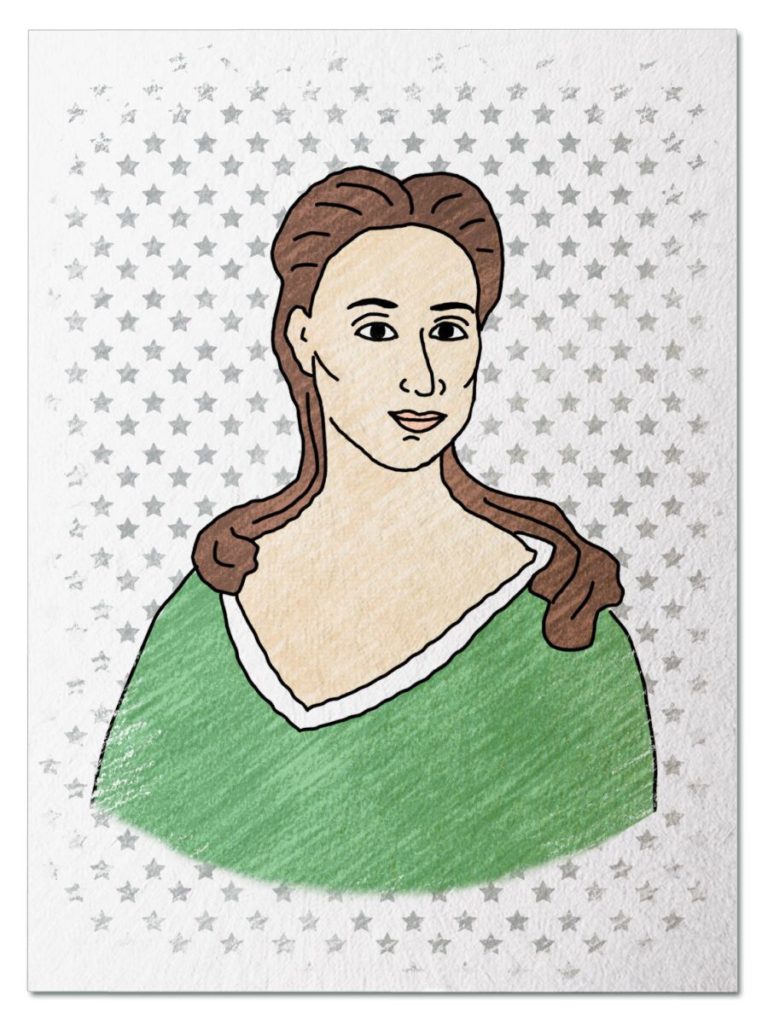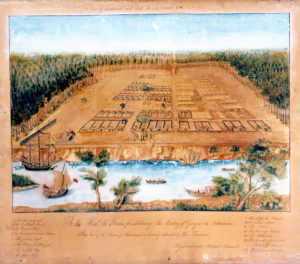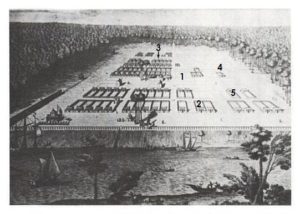
Passionate Patriot
She was a 32 year old mother of two when she arrived at the port of Savannah in 1732, not knowing whether the new Georgia colony would allow European Jewish immigrants to enter. More than 45 years later, she was a widowed businesswoman who supplied critical support to the American troops during the Revolutionary War at great risk to herself and her family. Travel back in time to 1779 and meet Abigail Minis…
Her Ruby Shoe Moment
The Power of the Wand
Her Yellow Brick Road
Brains, Heart & Courage
Glinda’s Gallery
Just the Facts
Her Ruby Shoe Moment
Abigail Minis stood at the window of the Minis Tavern. As she looked out onto the empty streets of Savannah, she silently listed all the different roles she was occupying at this moment in her life: widow, mother, farmer, tavern owner, and patriot. The streets weren’t usually this empty, but on this day in October 1779, Savannah was at war. Rebel troops – made up of the Continental Army, local Georgia militia, and French soldiers supporting the revolution – were at the outskirts of town. Their goal: to free Savannah from British control. They demanded the British surrender the city on September 16th. The British refused.

Abigail, her tavern, her home, and her family (American Jewish Archives Cincinnati)
The town residents were divided – there were Loyalists who supported the British occupation of Savannah, and Rebels who wanted their independence. The choice between the Loyalist and Patriot causes had been an easy one for Abigail. Abigail had arrived in the brand new colony of Georgia as an immigrant from Eastern Europe more than 40 years earlier. She and her late husband Abraham had built a prosperous life for their family in this new world. She was grateful that she – a Jewish widow – lived in a colony where she was free to own land and worship as she chose. The patriot cause appealed to her sense of fairness and freedom – the colonies should not be ruled by a King of a country an ocean away.
Abigail had been operating the Minis Tavern since 1763 with her five daughters assisting her. After her husband died, Abigail needed a steady stream of income to support her family. She had spent most of her adult life as a wife, mother, and homemaker. She used her experience running a house for her family to guide her in opening a tavern where locals could stop for a meal or drink, and weary travelers could stay in the rooms upstairs for a night or two while their horses were tended to in the stable.
Abigail was a skilled hostess, and the Minis Tavern soon became known as the place to go for “elegant entertainments.” It was frequented by the highest levels of Georgia society. Politicians, judges, lawyers, and wealthy businessmen gathered there to discuss the issues of the day. They enjoyed the tavern’s hospitality and soon were asking Abigail to cater official events. She was chosen to provide all the “provisions & liquors” for the grand opening celebration of the newly built Tybee Lighthouse.
During the early 1770s, the conversation at the Tavern turned toward the growing conflict with England over who should govern the colonies. When news reached Savannah in 1775 that the first shots of the Revolution had been fired at the Battle of Lexington & Concord, the discussions intensified but the fighting seemed far away. The British soldiers lost many battles in the north during the first few years of the Revolution and must of the population now supported the Patriots. In 1778, they decided on a new “southern strategy” to control southern ports and shore up support among the Loyalists there. Savannah wasn’t prepared for an invasion, and when British troops arrived in December 1778, the local militia didn’t have the supplies or experience to defend the city.
The residents of Savannah now had to make the choice that had only been theoretical until they were living under British military occupation – are you a Rebel or a Loyalist? Those that chose the rebel side had to be very careful. The men who wanted to fight the British had leave town to join the Continental Army or a militia working with them.
Taking Savannah back from the British was the next step. General Lincoln, who was commanding the southern forces, asked France to provide navy support. The French government, happy to help deal the British a losing hand, had signed a treaty with the Continental Army a year before. The French agreed to provide several ships and troops for the effort.
When word went out among the Savannah patriots that the Continental Army was lined up 10 miles outside of town, preparing to recapture Savannah, people finally chose their side. Abigail risked her business and her freedom to provide food, supplies, ammunition and uniforms to the Patriot soldiers fighting the British for American independence.
Despite the best efforts of the Rebel troops, the British had the city well-defended and were able to withstand the siege. Savannah stayed in British hands and the surviving troops retreated to Charleston. The British initially intended to prosecute Abigal as a “supporter of the rebellion” but she was determined to protect her family from charges of treason.
Abigail’s reputation in the community helped her – she and the Minis Tavern were beloved, and it is likely the Royal Governor knew that punishing her severely could backfire. Abigail knew that too, and successfully convinced him to allow her and her children to leave for Charleston. But before she left, arranged for the delivery of more food and supplies to the Revolutionary Army soldiers who had survived the siege and were regrouping outside of Savannah.
The Power of the Wand
Although the British succeeded in keeping Savannah, the spirit of the Patriots persevered, and Savannah was liberated in 1782, shortly before the Revolutionary War ended with a British surrender in 1783. Abigail continued to do everything she could to support the Patriot cause from her exile to Charleston. She returned to Savannah after the war, rebuilt her life and received some reimbursement from the American government for her support of the War.
The role of Jewish immigrants and citizens in American’s military life has often been overlooked or discounted. The Jewish War Veterans of America is one of the oldest active veterans group in the United States, founded in 1896 after accusations by some that Jewish-Americans didn’t participate in the Civil War. On Memorial Day, members “plant flags on graves of service members, participate in community events, and tell their stories of service to local organizations.”
Her Yellow Brick Road
Abigail and Abraham arrived in Georgia with a family of four, which they grew to a family of 12. Abigail spent her first eleven years in Savannah pregnant or caring for a newborn, with a baby coming every 2 years until she was 43. She thought her family was complete, but had one more baby four years later, when she was 47.

Georgia colony map.
Although much of her time was spent caring for her growing family, Abigail also served as an advisor and sounding board for Abraham in his business ventures. He started by farming the land they were granted as arriving settlers – Lot #94.He also set up a merchant shipping business that became a supplier of Fort Frederica, which was on St. Simons Island about 90 miles south of Savannah. General Oglethorpe built the Fort to protect Georgia’s southern border from Spanish occupied Florida. Over 600 troops were stationed there, along with a small town of colonists who provided services to the soldiers.
Abigail and Abraham were grateful for their good fortune – they had taken an enormous risk by immigrating to an undeveloped colony where few Jewish people lived. Everything had gone better than expected. They were financially stable. They had eight healthy children. And they were able to worship freely – they were founding members of the first synagogue in Savannah (and only the third in the American colonies), Kahal Kadash Mickve Israel. They looked forward to a life together enjoying the fruit of all their hard work.
And then tragedy hit. Abraham died in 1757. Abigail was devastated. She had Abraham had been partners in everything. His trust in her led him to name her the executor of his estate at a time when most men would not have dreamed of giving that power to his wife. Abraham’s will stated that he did so to “enable her to maintain educate and bring up our children.” He left Abigail everything except the horses (left to their sons) and the cattle (left to their daughters).
Abigail was now the head of the household and took her responsibility to provide for her family to heart. She had a nine year old, four teenagers, and her older daughters still lived at home. While most widows had to turn to male relatives or friends for income, Abigail had no other family in Georgia and did not want to become dependent on friends. Abigail discovered that widows could apply to the government for a land grant to help her support her family. She did so, and received a King’s Grant of 550 acres in 1760. Abigail used her income and savings from her holdings to purchase more land in Georgia and South Carolina.

Minis Family memorial at Mordecai Sheftall Cemetery.
Even though Abigail had built the family’s land holdings, she wasn’t entirely comfortable without a steady income. Land was fickle – one bad harvest or loss of livestock could be devastating. She inventoried her skills and decided her homemaking expertise would lend itself well to opening a tavern. The taverns of the 18th century were local gathering places where men gathered to eat, drink, and socialize. They also frequently had guest rooms for travelers and stables for their horses. Abigail had her own staff of 8 capable children – now all in their teens and twenties, who could help. She applied for a tavern license in 1763.
Brains, Heart & Courage
Abigail was raised in an Ashkenazi Jewish family, most likely in the Polish-Lithuanian Commonweath (today’s Poland, Belarus, Ukraine, Moldovia, Slovokia, Latvia, Lithuania). The Ashkenazi community were originally from the Rhineland areas of France and Germany (“Ashkenazim” means Jews of Germany). During the Middle Ages, prejudice against their community pushed many of them to move East, where they were welcomed. The General Charter of Jewish Liberties was first proclaimed by a Polish prince in 1263. The Commonwealth was one of the only places in Europe where the Jewish community was protected from governmental persecution. By 1600, most of the Jews in Europe lived there.
Abigail married Abraham Minis, also an Ashkenazi Jew. At some point after their second daughter was born, they decided to leave Europe and make a life for their family across the ocean in Georgia. Georgia was the last of the British colonies, founded in 1732 by a retired Army General named James Oglethorpe. One of his goals was to attract poor, hardworking people from London to start a new life. He petitioned the Crown, got permission, and set up a Board of Trustees to grant land to settlers and make laws.

Photo of Savannah Settlement. Abigail and Abraham were granted the land lot marked by a 3. (Museum of Southern Jewish American History)
So in the late spring of 1733, Abigail, Abraham and their two daughters, Leah & Esther, boarded a ship at a London port. They were part of a group of 42 Jewish immigrants hoping to settle in Georgia. They knew the journey wouldn’t be easy – at the time it took an average of 7 weeks to cross the Atlantic. And they left without asking General Oglethorpe if they would be welcome – or even allowed to step off the boat when it arrived in Savannah. Instead, they took the chance that he needed hard working people to make his project a success, and would not turn them away once they were at his port.
Fortunately, their gamble paid off. When they arrived in Savannah on July 11, 1733, they sent a request to General Oglethorpe asking if they could stay. He responded that they had to remain on the ship until he could consult with his lawyers in Charleston to get their advice on whether Georgia’s charter would allow them to stay. Abigail was worried, but did her best to remain calm and be prepared for whatever decision was made. When a message arrived from General Oglethorpe, they all held their collective breath as it was read. The news was better than expected – General Oglethorpe not only welcomed them to Savannah, he decided to give them all a plot of land. Abraham and Abigail received Lot #94. Now, it was time to build their new life.
Glinda’s Gallery
Just the Facts
- Abigail was born on August 11, 1701.
- Abigail gave birth to nine children. Sadly, one son, christened Minis. died as an infant. Her five daughters were Leah, Esther, Judith, Hannah, and Sarah. Her three surviving sons were Phillip, Joseph, and Samuel. Phillip was the first male child born to colonists in Savannah.
- The group of 42 Jewish immigrants Abigail and Abraham arrived with became the largest Jewish settlement in the New World.
- After the English surrendered and the Revolutionary War ended in 1783, Abigail returned to Savannah. She spent the rest of her life there supporting her family and growing her land holdings and business ventures.
- Abigail died on October 11, 1794. She was 93 years old. Her obituary observed that she was “blessed with a great share of health through a life of uncommon duration.”
- One of the most precious pieces of cargo on the ship that brought Abigail and her family Savannah was a set of Torah scrolls. Congregation Mickve Israel still has that Torah today, now kept behind glass to preserve it – as it is written with quill on deer skin held together with cow gut.
- The Minis family still thrives in Savannah today.
Want to Know More?
Snyder, Holly. “Abigail Minis 1701-1794” (The Shalvi/Hyman Enclyclopedia of Jewish Women).
Staff. Founding Mother: Abigail Minis (Freeman’s Rag Mar. 31, 2018).
Staff. “Kindred Spirits” (Savannah Magazine Apr. 26, 2017).
Staff. “A Legacy of Leadership: Abigail Minis, Family Leader and Businesswoman” (Georgia History Festival Nov. 10, 2017).
Staff. Siege of Savannah (New Georgia Encyclopedia).
Ware, Gabrielle. “Forgotten Women Part 1: Abigail Minis” (GPB News May 11, 2015).
